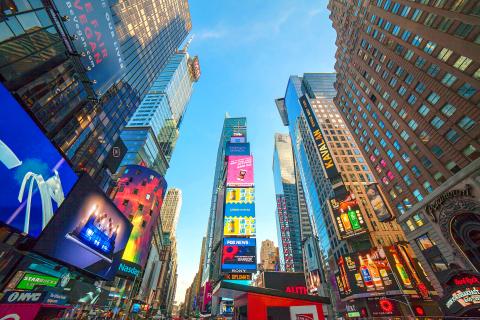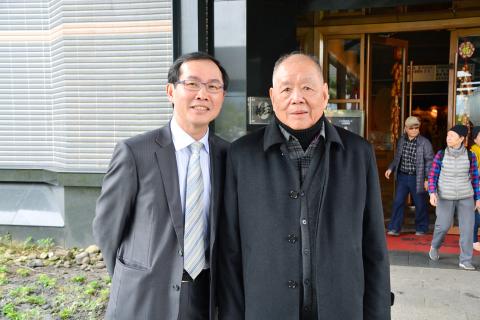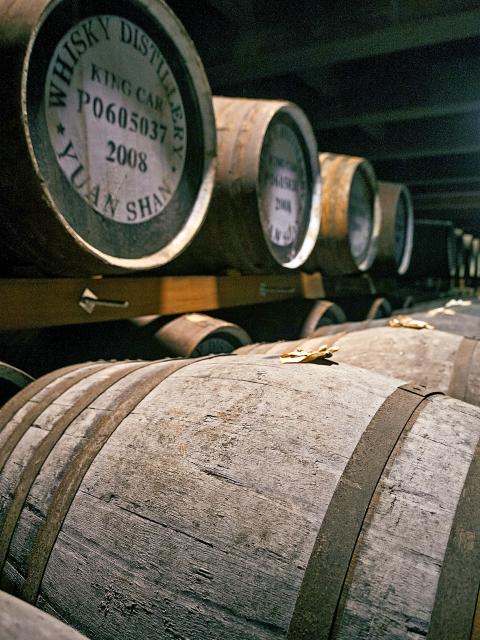Two lone customers are waiting by the free tasting area in the Kavalan distillery in Yilan County. The tasting session doesn’t start for another 10 minutes. A member of staff walks through the cordon.
“What’s here, then?” a customer asks.
“Jiu ah (酒啊),” she replies. Booze.

Photo courtesy of King Car Group
And that’s exactly what they can expect. Free tastings of some of the finest single malt whiskies known — a claim backed up by some of the world’s foremost whisky experts — proudly produced here in rural, sub-tropical Yilan.
Kavalan has picked up a total of 210 first prize awards since it started entering competitions in 2010.
The company’s Solist Amontillado Sherry — a touch of oak on the nose and a palate of soft sherry with a hint of caramel — was crowned the World’s First Single Malt Whisky Single Cask at the World Whiskies Awards (WWA) Dinner in London this year.

Photo courtesy of King Car Group
Last year, the WWA gave Kavalan’s Solist Vinho Barrique the Best Single Malt Whisky Award, officially making it the world’s best single malt whisky.
How long has it taken Kavalan whisky to scale these heady heights, and best the finest offerings of established distilleries in Scotland? Ten years.
Kavalan is the culmination of the dream of King Car Group (金車) Chairman Lee Tien-tsai (李添財) and his son, CEO Lee Yu-ting (李玉鼎). The company, established in 1979, launched the Mr. Brown Coffee (伯朗咖啡) brand in 1982 and opened the Yilan distillery in 2005. The production line was completed in only 9 months, following a viability study and the 2002 lifting of restrictions on private companies in Taiwan having their own breweries or distilleries. The company had its first Kavalan products on the market in 2008.

Photo: Taipei Times
Taiwan’s hot and humid climate, very different from that in Scotland, provides unique challenges and opportunities for Kavalan.
The yeast is imported from France, the malted barley from Scandinavia, as they cannot be grown in Taiwan; the company brought in consultants from Scotland; special whisky stills and equipment have been imported from Scotland and Germany.
Kavalan’s team of researchers, consultants, and master blender Ian Chang (張郁嵐) — who trained in England and Scotland — frequently travel abroad, to Europe and the US, in search of the best casks — sherry, port, bourbon, brandy — in which to mature Kavalan whisky. In fact, the team had just returned from Spain two days before the Taipei Times visited the plant. Old casks are simply not available in Taiwan, for the simple reason that Taiwan does not have a whisky producing tradition.

Photo: Taipei Times
Even storage presents its own set of problems, due to Taiwan’s sub-tropical climate.
But there are also definite advantages to producing whisky in Taiwan. The high temperatures allow the maturation process to happen far more quickly than it does in Scotland’s cold climate — thus far, Kavalan’s whiskies are typically left to age for four years — and the distillery has a plentiful supply of naturally-filtered spring water from the nearby Snow Mountain and the Central Mountain Range.
Spurred by its success in international competitions, Kavalan is now undertaking an ambitious expansion that will see production almost double from five million to nine million bottles a year when its latest extension is completed in December. Lee Yu-ting tells the Taipei Times that he has plans to continue expanding operations for the next 20 years.
Lee says that the main market for Kavalan is the domestic market here in Taiwan, but it sells the whisky in over 40 countries worldwide. The China market is not yet ready for premium single malt whisky, however, Lee says, and the main markets remain Europe and the US.
In fact, this year will see the company marketing its brand overseas. Earlier this year it paid for a series of advertisements in TIME and Newsweek, and has recently had its products emblazoned across a building in New York’s Times Square.
Times are looking good for the world’s first ever subtropical whisky distillery.
Warning: Excessive consumption of alcohol can damage your health.

April 14 to April 20 In March 1947, Sising Katadrepan urged the government to drop the “high mountain people” (高山族) designation for Indigenous Taiwanese and refer to them as “Taiwan people” (台灣族). He considered the term derogatory, arguing that it made them sound like animals. The Taiwan Provincial Government agreed to stop using the term, stating that Indigenous Taiwanese suffered all sorts of discrimination and oppression under the Japanese and were forced to live in the mountains as outsiders to society. Now, under the new regime, they would be seen as equals, thus they should be henceforth

Last week, the the National Immigration Agency (NIA) told the legislature that more than 10,000 naturalized Taiwanese citizens from the People’s Republic of China (PRC) risked having their citizenship revoked if they failed to provide proof that they had renounced their Chinese household registration within the next three months. Renunciation is required under the Act Governing Relations Between the People of the Taiwan Area and the Mainland Area (臺灣地區與大陸地區人民關係條例), as amended in 2004, though it was only a legal requirement after 2000. Prior to that, it had been only an administrative requirement since the Nationality Act (國籍法) was established in

With over 80 works on display, this is Louise Bourgeois’ first solo show in Taiwan. Visitors are invited to traverse her world of love and hate, vengeance and acceptance, trauma and reconciliation. Dominating the entrance, the nine-foot-tall Crouching Spider (2003) greets visitors. The creature looms behind the glass facade, symbolic protector and gatekeeper to the intimate journey ahead. Bourgeois, best known for her giant spider sculptures, is one of the most influential artist of the twentieth century. Blending vulnerability and defiance through themes of sexuality, trauma and identity, her work reshaped the landscape of contemporary art with fearless honesty. “People are influenced by

The remains of this Japanese-era trail designed to protect the camphor industry make for a scenic day-hike, a fascinating overnight hike or a challenging multi-day adventure Maolin District (茂林) in Kaohsiung is well known for beautiful roadside scenery, waterfalls, the annual butterfly migration and indigenous culture. A lesser known but worthwhile destination here lies along the very top of the valley: the Liugui Security Path (六龜警備道). This relic of the Japanese era once isolated the Maolin valley from the outside world but now serves to draw tourists in. The path originally ran for about 50km, but not all of this trail is still easily walkable. The nicest section for a simple day hike is the heavily trafficked southern section above Maolin and Wanshan (萬山) villages. Remains of